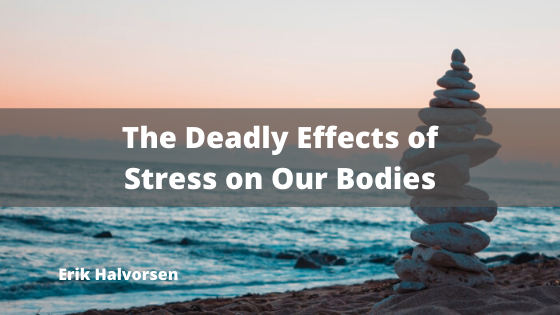As we enter the New Year, health, wellness, and resolutions to eat better and get more exercise are priorities for most of us who have not yet made them permanent fixtures in our way of life. Whether you launch into 2020 with a keto or Mediterranean diet and/or join Orangetheory, Equinox or that cult (I mean gym) CrossFit—or just subscribe to the burn more calories than you take in tried and true method—we all start off with the best of intentions. In the last couple of years, the newest health threat has been sitting too much—in our offices and homes—and we have seen the emergence of stand-up desks and “how many steps have you taken today” has become a normal part of everyday conversation. But maybe the most well-accepted cause and least understood “silent killer” that we collectively do a terrible job of managing is stress.
The human body functions best when it is in a state of homeostasis—in a condition of balance, harmony, and stability. Our bodies have evolved to have a number of compensatory mechanisms to maintain a balance for pH, O2/CO2, electrolytes, glucose/insulin, immune response activation/de-activation, hormone levels, and many other physiological systems. When the homeostatic state for these physiological balances is thrown off due to genetic or environmental changes over time, they may eventually experience a number of problems in their mental and physical functions. This may result in a variety of symptoms from headaches, nausea, and exhaustion to more pronounced situations, such as high blood pressure, diabetes, auto-immune diseases, and cancer.
The medical community continues to elucidate the cause and effect relationship between bacteria, viruses, toxins and our genetics and how those lead to illness. Researchers and companies continue to develop new and better drugs, vaccines, medical devices, and even gene therapy and gene-editing technology to “fix us” when we get sick. But what about our “mind-body” connection? And no, that is not just a term used by alternative medicine charlatans. The connections between our physical and mental well being are well established if still poorly understood mechanistically. Psychosomatic Disorders are a set of physical diseases that are either caused or made worse by mental factors such as anxiety or stress. According to the Cleveland Clinic, depression can be caused by chronic illness and further exacerbate the illness thereby “causing a vicious cycle to develop.”
The rates for depression that occurs with other medical illnesses is quite high (national average for depression without co-morbidities is ~7-10%):
- Heart attack: 40%-65%
- Coronary artery disease (without heart attack): 18%-20%
- Parkinson’s disease: 40%
- Multiple sclerosis: 40%
- Stroke: 10% to 27%
- Cancer: 25%
- Diabetes: 25%
A recent article in Psychology Today explains that stress is a constant in our lives; it is always in flux and that stress and our bodies’ response to it is not in and of itself a bad thing. Think “fight or flight” our evolutionary response to making sure we didn’t get eaten by that annoying dinosaur. That dino-stressor kicks off a cascade of hormones that elevate our blood pressure, heart rate and increase our energy burn presumably so we can outrun that T-Rex. That’s all well and good, but I don’t think I will need to outrun a dinosaur or even a lion anytime soon. So what if our bodies are exposed to other non-carnivore caused periodic high-level stressors or chronic state of stress that trigger these cascades? What does that do to our bodies?
In a recent review of the physiological effects of stress, scientists and clinicians have demonstrated the negative effects on everything, including our central nervous system, cardiovascular, immune, gastrointestinal and endocrine systems. We are all familiar with stress-induced headaches, difficulty sleeping, and upset tummies, but unmanaged stress can also negatively impact a person’s cardiovascular system by increasing blood pressure and heart rate which over time can lead to “stress” cardiomyopathy or increased risk of heart attack and stroke. Studies have shown impairments in memory recall, as well as cognitive processing, are also linked to chronic stress.
Let’s face it, we all encounter some form of stress usually on a daily basis. We have demanding workdays, tiresome and/or tedious long commutes to our jobs, worrying about bills and the demands and responsibilities that come with raising our kids. Speaking from experience, couples will also experience stress from their relationships at times and business owners can also be stressed out about the success of their personal enterprises. While we can all expect to be stressed out over something in our lives at some point, allowing ourselves to continually remain in a state of stress could lead to serious health problems.
Healthline reports people who are stressed usually have a hard time controlling their emotions. Sound familiar to anyone? These emotional outbursts can lead to or exacerbate already existing problems with our spouse (or significant other), friends, family or co-workers. This can lead to even more stress and physical illness.
So, as you make those New Year’s resolutions, let’s not lose sight of how important removing or managing our stress is to our health, happiness, and well being. Resolve to try to be more self-aware of your own stress and how it is affecting you and others around you. Don’t be afraid to talk to your doctor, spouse, family or friends about things that are stressing you. There is no shame in speaking up and you can take comfort in the knowledge that you are definitely not alone. Take steps to remove stressors where you can. When that is not possible, identify and try a variety of ways to cope with, manage and reduce that stress. Look, I am not an expert on what works or doesn’t—different things work for different people. Maybe it’s a long walk, listening to music, meditating, hitting the gym, playing a video game with your kids or just giving and receiving a BIG hug from your spouse.
Life is life and we will never be stress-free— but let’s resolve to reduce our stress levels in 2020 and to help those around us as well.
Erik Halvorsen is a devoted father, loving husband, and ambitious innovator; he is consistently searching for new technology to help cure diseases, benefit patients’ lives, and change how we experience healthcare. He was named one of the top 30 Chief Innovation Officers in healthcare in the country, and he has been listed as one of the Top 40 Under 40 in Boston. Erik is also a member of the Forbes Technology Council.

